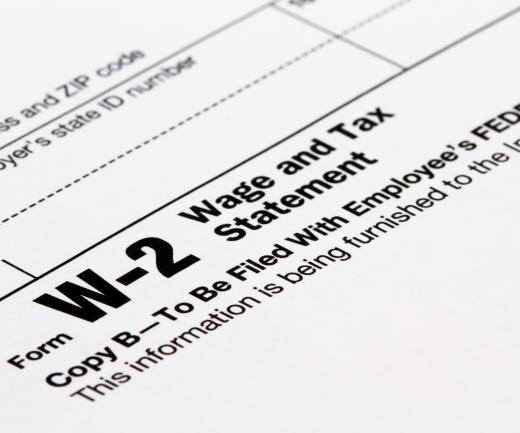At WiseGEEK, we're committed to delivering accurate, trustworthy information. Our expert-authored content is rigorously fact-checked and sourced from credible authorities. Discover how we uphold the highest standards in providing you with reliable knowledge.
What are Payroll Taxes?
Payroll taxes are taxes deducted from one's salary or wages. There are essentially two types of payroll taxes, though this can vary among countries. Typically, there are those payroll taxes paid by the employee and those paid by the employer.
In the US, most employers are required by law to take out payroll taxes to meet the taxes levied on the employee's income. These taxes include deductions for both state and federal taxes. Employers must also tax their employees for Medicare and Social Security — two distinct federal health, disability, and retirement programs.

While payroll tax is based on the employee's income, payment for the tax comes from the employer and the employee. The employer, for example, is obligated to pay half of the Medicare and Social Security tax levied on an employee's income. This payment is called the withholding, because the employer basically withholds that tax amount from the employees paycheck. The employee pays the other half, as well as other state and federal taxes.

Under certain circumstances, some paychecks may not be reduced by payroll taxes. In the US, for example, independent contractors are required to satisfy tax obligations completely on their own because essentially independent contractors work for themselves. That is, the independent contractor is both the employer and the employee. Some contractors file quarterly tax statements to avoid a large tax payment at the end of the year. Others, typically those that don't make large annual amounts, meet their tax obligations once a year.

Other countries have a pay as you go payroll tax system. This means each time an employee gets paid, his or her salary will be reduced by the respective tax amount. Companies may be obligated to meet some of these taxes too, depending upon the country's tax rules.
Sometimes the term payroll tax is specific to the employer contributions only. In Australia, payroll tax refers to those tax requirements levied on employers. This is not the amount taken from employee pay, although Australia does require some employee contributions for things other than the payroll tax.
It’s important for employers to understand the applicable tax laws when addressing their obligations in payroll taxes. Failure to withhold the appropriate amount or to meet their own tax obligations can quickly get a company in trouble with government tax collecting agencies. For this reason, some employers choose to use a payroll company or develop a dedicated payroll department.
AS FEATURED ON:
AS FEATURED ON:













Discussion Comments
Please help me by clarifying the following question.
Australia payroll tax is calculated state-wise. Please let me know whether the state is identified based on the employer location or employee location? --Adyar
Great article with a lot of useful information. Thanks for posting! --Tawnya
Post your comments